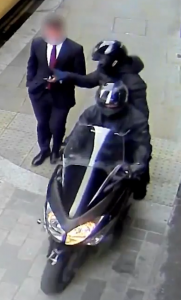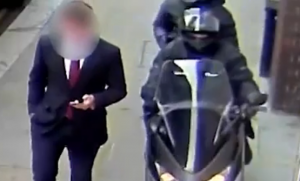Scooter Crime, a new epidemic?

The moment a pedestrian is relieved of his phone
Last week the police in London released footage of a woman being dragged down the street behind a scooter during a failed bag snatching attempt. In these days we can get lost in news of large events and miss news about trends that are more likely to affect us.
Luckily the woman was only ‘battered and bruised’ and not more seriously injured, however should she have let herself to be dragged down the street at all? This story was originally going to be about how you might deal with a similar situation but on further reading relating to this case there seems to be a ‘epidemic’ of scooter crime which raises further questions about crime trends, situational awareness and knowing what to do in dangerous situations.
Police stats showed that in 2016 there were over 8000 crimes committed by persons on 2-wheeled transport (motorbikes, scooters and bicycles), up from 317 in 2011; that is a 1600% increase over 5 years. In the first 4 months of this year over 5,500 crimes have been reported, just under 50 per day. This is a huge number (and doesn’t include unreported incidents) and something that anyone living in or visiting London should be aware of.
Anyone walking down any street in any city, town or village and watching their fellow pedestrians will understand instantly how easy a crime this is to commit. Most people nowadays are nose-down in their phone screen, paying the scantest attention to what is going on around them, often with headphones in and therefore unable to hear what is going on. That phone that is in their hands is too easy to snatch and 2 wheeled transport means the perpetrators can flee the scene almost before the victim knows what has happened. Anything not securely fastened to you is at risk.
When confronted by crime we advise that you minimise the risk of injury or worse to yourself, which in the case of a scooter theft means letting go of the item. Most bags that are snatched are only held over one arm which the thieves think will slip away easily, it is much rarer that they will attempt to grab a backpack secured over two shoulders or a bag with a strap over ones head as this will likely lead to the victim being dragged along unable to rid themselves of the item.
So how can we better prepare ourselves?
Firstly, keep abreast of what crimes are occurring where you live/work/travel. The police frequently create timely campaigns to alert the public about crime trends and prevention, pay attention to these and read up travel advice (Government or other) about your destination if travelling.
Secondly, consider carefully what you are carrying; do you need everything and are you carrying those items securely enough for their value/worth? Do you have anything on display that may attract the attention of thieves; jewellery, watches or electronic items? If you look in the mirror and can’t see anything easy to snatch the chances are that you unlikely to fall victim to this type of crime.

Pedestrian oblivious to scooter on pavement beside him just before being robbed
Thirdly, consider your situational awareness, this is being aware of your surroundings and possible threats lying therein. Whether travelling or at home we all do this to a greater or lesser degree, it isn’t a black art, but is a skill we should all practise more. Resist the temptation to bury your head in your phone, to have your earphones on when walking; instead keep your head up, observe and review the route ahead. Some things to consider:
- Walk towards the oncoming traffic, that way it is harder for a vehicle to come up behind you (although pavements and pedestrianised zones can be mounted, especially by bicycles)
- Look at other people, do any stand out or cause alarm?
- Are there places where you may be at extra risk, such as a pedestrian crossing island?
- Are your bags secured, zips done up, over shoulders; carried away from the road
The further advantage of good situational awareness is that it protects you from nearly all crimes as there will always be someone easier to target than you.
Finally, if you do lose an item, are you prepared? Do you know exactly what you are carrying so you can cancel items, claim against insurance and reload from a back up? At home and abroad try to carry just what you need, empty out your daily bag every now and again, review your wallet/purse and back up electronic devices and activate remote lock down/find functions you may have.
All these activities will make you less likely to resist the crime that potentially can lead to bodily harm, either by being dragged/knocked down or the criminals resorting to using violence to get what they want.
22nd June 2017